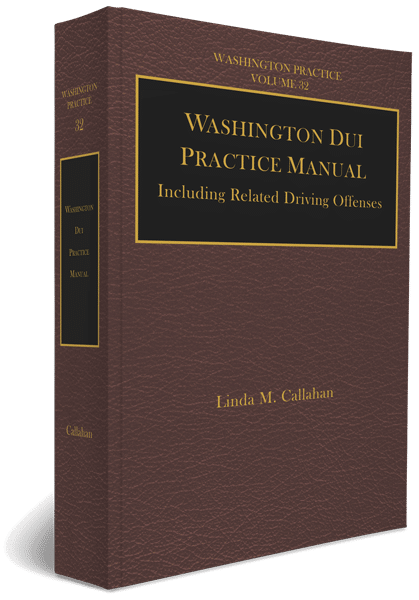
Hi, I’m Linda Callahan, a DUI attorney with years of experience helping folks like you navigate the tricky waters of DUI charges and license suspensions.
Getting charged with a DUI is stressful, but there’s hope.
Driving is one of the most important privileges we have. We need to drive to take care of our everyday needs, including work and family.
Understanding your driving options when arrested for a DUI is central to most of our clients. The most crucial step you can take is to request a DUI hearing. Let’s dive into why this hearing is necessary and how my team can help you make the most of it.
If you’ve been arrested for a DUI in Washington State, you will likely face a separate License Suspension from the Criminal DUI charge in court.
This suspension is administrative, not criminal.
If you took a breath test over the legal limit or are accused of refusing the breath test, you have three options:
02
You can drive legally by applying for the Ignition Interlock License.
03
Not Drive at all
You can choose to sit our your suspension but you must re-instate.
The suspension on a first DUI in Washington State is typically 90 days if you took the breath test or your blood test results are at or above a .08. Learn more here.
No. The license suspension does not start until the 30th day of your arrest if you do not apply for a DUI Hearing within 7 days.
If your breath or blood test are at or above a .02, you will be looking at a 90-day suspension. Learn more here.
If you are accused refused to submit to a breath or blood test, and this is the first DUI within 7 years, you may be suspended for one-year administrative suspension. Learn more here
If you miss the seven-day deadline, your license will be automatically suspended on the 30th day following your arrest. It’s crucial to submit your request on time to avoid this outcome.
If blood was taken, it’s still crucial to request a hearing within seven days to prepare for any future license suspension and notify the DOL of your intent to fight the suspension. The DOL usually waits for the blood test results before informing you of your right to request a hearing. This can take months, even up to a year.
No. The DOL puts a “stay” or a hold on the automatic suspension if you apply for the hearing within 7 days.
You will be allowed to drive legally until the hearing is held and a decision is made by the DOL.

DUI Case Results
**Updated 08/03/2023**
Essential For Everyday Life
Driving is an essential part of everyday life, and the hearing can help you retain or regain your ability to:
Request a DUI Hearing Is a Beacon of Hope
Requesting a DUI hearing is not just essential; it’s a beacon of hope. If you don’t request a hearing, your license will automatically be suspended 30 days after your arrest.
Giving You More Time
By requesting a hearing, you can delay the suspension and buy yourself some time to prepare your defense. It’s a chance to turn things around and maybe even keep your license, which can bring a huge sense of relief.
Challenge the Evidence
Requesting a DUI hearing allows us to review and contest the evidence against you, potentially saving your driving privileges.
We Author the DUI Manual Defense Attorneys rely on everyday for DUI Defense Strategies.

Contact us today for a 100% Free Consultation
Requesting a DUI hearing in Washington State involves several steps. However, when you hire our firm, we take care of everything for you, making the process smooth and stress-free.
We offer a reasonable flat fee, which includes the DOL Hearing Fee of $375.00, to request the hearing on your behalf and start our investigation.
After your arrest, the most crucial step is to contact our firm as soon as possible. The seven-day window to request a hearing starts from the date of your arrest, so prompt action is essential. When you reach out to us within five days, we can handle the hearing request for you. Our experienced team will guide you through the next steps and start preparing your case right away, emphasizing the urgency and importance of the situation.
We’ll need some basic information from you to complete the hearing request on your behalf. This includes personal details and any documentation you received from the arresting officer. Don’t worry—we handle all the paperwork, ensuring everything is completed accurately.
Our firm will complete the “Driver’s Hearing Request” form and submit it to the Department of Licensing on your behalf. We’ll also send the $375 hearing fee, which our service package includes—there is no need to stress about additional costs or payments during this process.
To ensure everything is done correctly, we’ll obtain proof of mailing and keep records of the submission. This guarantees that your hearing request is processed on time and protects your right to contest the suspension of your license.
Once you hire our firm, we manage all aspects of your DUI hearing request, allowing you to focus on other important matters. Here’s what you can expect:
Confirmation and Scheduling
After we submit your hearing request, the Department of Licensing will send a confirmation and schedule your hearing. We’ll notify you of the date and time and start preparing your defense strategy immediately.
Preparing for Your Hearing
Our legal team will thoroughly review all evidence, including police reports, relevant documentation, and any audio or video available. We’ll gather witness statements and build a solid defense for the hearing. Throughout this process, we’ll keep you informed and prepared, ensuring you feel confident and secure in our thorough review.
If you can’t hire us within the seven-day window, you can still request the hearing on your own. Here’s how:
After your arrest, the officer should provide you with a ‘Request for DUI Hearing‘ form. This is your official request for a DOL hearing with the DOL. Fill it out accurately and thoroughly.

Fill out the form with your personal information. Leave the attorney information section blank initially; your attorney can notify the DOL later that they represent you.
Include a check or money order for $375 with your hearing request form. This fee is non-refundable and required to process your request.
Mail the completed form and payment to:
Administrative Law Office Department of Licensing
PO Box 9048 Olympia, WA 98507-9048
It’s essential to have proof that you mailed your request on time. Take the envelope to the post office and request a “Certificate of Mailing.” Keep this certificate safe.
You can also request a DUI hearing online through the DOL’s License eXpress service. This method is more convenient and faster, which can be a relief during stressful times.
Requirements for Online Request
To request a hearing online, you need to:
Sign up for License eXpress, a free online service with the Department of Licensing.
Once you have logged in, navigate to the menu on the right under “Driver Information” and click on the “Request a DUI Hearing” link.
Fill out the online form with your personal information.
Pay the $375 hearing fee using a credit or debit card.
Review your information and submit the request.
Step #1 - Investigation
Preparing for a DOL Hearing takes significant time investigating the facts of the case leading to the subpoena of the arresting officer or witnesses.
Step #2 - Requesting a Continuance
Step #3 - Subpoena

Determining Witnesses
Issuing and Serving Subpoena's
Telephonic Hearing
Exhibits
Introduction of Exhibits:
Decision on Exhibits:
Testimony
Witnesses:
Your Testimony:
Legal Arguments
Submission of Arguments:
Role of a DUI Lawyer:
3 Reasons to Hire Us
#1
Experience
Our Team of Attorneys and Paralegals have over 30 years of combined experience. We know the law and understand how to apply it to your case.
#2
Focused on You
We create a custom defense for every client. Not all cases are the same and we know that. Your concerns and goals are our top priority.
#3
Reputation
As a long-time author and speaker, Ms. Callahan is respected across the county for her trial skills and investigative knowledge. Her reputation proceeds herself when appearing in court.
There Is No Time to Waste!
Complete this form to speak with our intake team today.
What Experience Does Callahan Law Offer?
Why Should You Choose Callahan Law?
You may be wondering if a lawyer really can help you win your DOL hearing, or if fighting the DOL is even worth your time and energy.


The following is a partial list of some of the reasons that DOL might dismiss your case, and facts that a good DUI lawyer will look at in your case:
Incomplete or Defective Report (a missing key element of evidence)
If the officer was careless in filling out the police report, he or she may have left out critical information. Or, the officer may have sent only a portion of the report to DOL and left out a necessary piece of it.
A good DUI lawyer can determine whether the report is missing any information that DOL needs to suspend or revoke your license.
Illegible Report
If parts of the officer’s report are not legible, the hearing officer might not be able to read critical pieces of information.
A good DUI lawyer can determine whether the illegible parts fail to prove some necessary fact that without which the hearing officer cannot suspend or revoke your license.
Boxes Not Checked or Typos
Sometimes an officer will leave out critical information by not checking a necessary box or by making a typographical error. Not all boxes on the report must be checked.
We will determine which boxes should have been checked in your case based on the facts of your case.
If all necessary boxes are not checked, sometimes the matter can be won if the information is not given elsewhere in the report.
Missing Pages
If the police officer leaves out critical information by not including all of the pages that the report should contain, your case may be dismissed. Not every page contains critical information.
A knowledgeable DUI DOL hearing attorney will know what the police report must contain and know when pages are missing.
Officer Error
No one is perfect, and police officers, like everyone else, make mistakes.
A seasoned DUI lawyer will be on the lookout for the sometimes subtle signs of officer error and can identify those errors that might tear down the state’s case against you.
Sometimes even a “minor oversight” or officer forgetfulness means that you could win under Washington law.
Collateral Estoppel
Under the law, the government may be unable to prove its case because it already lost part of its case in another proceeding (such as a criminal DUI case).
If you were charged with a crime, an experienced lawyer will evaluate your case to see if collateral estoppel applies.
DOL Error
Just like police officers, DOL doesn’t always get it right.
We will evaluate the facts to determine if DOL destroyed its own case against you.
For example, DOL may have not followed the necessary timeline in your case or provided you with the information to which you were entitled at the time you had the right to have it.
Credibility
Credibility has to do with whether or not a statement is believable.
If the hearing officer does not or should not believe a report or a witness’s testimony, it may be key to winning your hearing.
A lawyer who has experience in DUI is trained to spot a credibility issue and has the tools necessary to expose a credibility problem of a witness to the hearing officer.
For example, your lawyer might catch a witness in the act of contradicting himself or herself or showing that a statement cannot possibly be true. If one statement is shown to be false, a good lawyer may be able to convince a hearing officer to throw out everything the person said.
Legal Issues
The Washington legislature has created a web of intricate laws related to DUI cases and driver licensing.
Also, Washington courts have created judge-made laws that may be able to help you win your case.
You may be entitled to win your case if DOL just doesn’t have enough evidence to make a point that the state must make in order to win.
If you don’t consult a knowledgeable Washington DOL hearing lawyer, you might not even know that your rights were violated or that you deserve to win.
Unlawful Stop
A police officer cannot pull over your vehicle without a good reason under the law.
If the police officer should not have pulled you over, anything he or she saw, heard, or learned afterward typically cannot be used against you by the state.
Unlawful Arrest
The police cannot arrest a person for DUI or Physical Control without probable cause.
It may have been unreasonable for the officer to place you under arrest if he or she did not have enough information to suspect you committed a crime at the time he or she arrested you.
We will thoroughly investigate these and other important issues.
Because good evidence can become harder to find as time passes, it is important to contact our Washington DUI attorneys as soon as possible after your arrest so that the key facts and evidence in your case may be recorded and preserved.
This will allow your lawyer to have the best opportunity to help you keep your license.
The hearing officer must prepare a written decision called a “final order” that announces a decision about all of the issues in your case. You and your lawyer can expect to receive this decision by mail, usually within a few weeks after the hearing.
The final order will state whether the proposed suspension or revocation will go into effect and if so, when it will go into effect, or whether your DOL case is dismissed. Consult with your lawyer to discuss all of the available options at this point. Once you receive the final order, you have 30 days to appeal the case to the superior court if DOL did not dismiss your case. This option is discussed in more detail below.
If you wish to challenge the final order, you may file a petition for reconsideration with the hearing officer who decided the case. Here’s how it works:
Filing for Reconsideration
Timeframe: You have 10 days from receiving the final order to seek reconsideration.
Eligibility: Reconsideration is available if:
Process After Filing
Hearing Officer’s Decision:
Effect on Suspension or Revocation:
After Reconsideration
Outcome:
Appeal:
Considerations
If you wish to appeal the hearing officer’s final order, you must petition the superior court within 30 days. Here’s what you need to know:
Filing the Appeal
Deadline: File your petition within 30 days of receiving the final order.
Costs: You are responsible for:
Stay of Suspension or Revocation:
What the Superior Court Reviews
Legal Errors: The court will assess if the DOL made any legal errors.
Evidence Review: The court will not reverse the hearing officer’s decision based on factual disputes unless it is not supported by substantial evidence. Appeals are rarely successful on credibility issues related to the law enforcement officer’s report or testimony.
Court Proceedings
Legal Briefs and Arguments: Your lawyer can submit legal briefs and present oral arguments.
Court Decision: The superior court may:
Considerations for Appeal
Incentive to Appeal: If your lawyer believes the DOL’s decision is unsupported by evidence or law, appealing may be beneficial.
Alternative Option: Ignition Interlock License
If You Do Not Appeal: You can apply for an Ignition Interlock driver’s license.
Conditions: You must:
If you are entering a deferred prosecution in your criminal case and meet certain criteria, you may request a “stay” of your license suspension or revocation. Here’s how it works:
Eligibility for a Stay
Washington Laws:
Exclusions:
Steps to Request a Stay
1. Obtain the Form:
2. Commitment and Risks:
Requirements to Qualify for a Stay
To qualify for requesting a stay, you must meet the following criteria:
1. Breath or Blood Test:
2. First Deferred Prosecution:
3. File the Form:
An Ignition Interlock Device (IID) is equipment installed in your vehicle’s ignition system. It requires you to provide a breath sample:
Before Starting Your Vehicle: You must blow into the device to start the engine.
Random Intervals While Driving: The IID may require additional breath samples while you are on the road.
If your license is suspended or revoked due to a DUI or related arrest, installing an IID and applying for an Ignition Interlock driver’s license (IIL) allows you to continue driving your personal vehicle under these conditions:
Eligibility Requirements:
Limitations:
Costs:
1. Administrative Suspension or Revocation
Eligibility:
Application:
Non-WA License Holders:
2. Conviction-Related Suspension or Revocation
Eligibility:
Application:
Ineligibility:
Importance of an Ignition Interlock License
Having an Ignition Interlock License (IIL) in WA allows you to:
Adhering to the rules and using the ignition interlock device is both a requirement and a responsibility, crucial for regaining your driving privileges.
Install an ignition interlock device in every vehicle you will be driving. We recommend Smart Start here in Washington State. They will notify the DOL that you have the device installed.
Get proof of financial responsibility, such as a Certificate of Insurance (SR-22) from an insurance agent.
Complete the “Restricted Driver License Application” and submit it to DOL with a check or money order for the IIL Application Fee ($100): in person at any driver licensing office, OR
by mail to:
Restricted License Department of Licensing PO Box 3907
Seattle, WA 98124-3907
It may take two weeks or longer to receive your IIL; typically they are received the day the suspension or revocation is to begin, so long as the application was received early enough to be processed in that time frame. Please consider this in determining if and when you should apply for an IIL. If you don’t allow enough time for DOL to process the request before your license is suspended/revoked, you will not be permitted to drive AT ALL.
If you drive without the IIL after your license suspension/revocation has taken effect, you may be charged with the crime of Driving While License Suspended or Revoked, resulting in incarceration or bail for the current offense if you’ve violated the court’s conditions of release, an additional criminal conviction, as well as an additional year of license revocation added to the current suspension or revocation.
When driving with an IIL, you are required to maintain an Ignition Interlock Device (IID) in all vehicles you operate, with specific exceptions:
Employer-Owned Vehicles:
Obtaining the Employer Exemption
1. Employer Declaration:
2. Requirements for Eligibility:
Limitations
Commercial Vehicles:
Questions To Ask a DUI Lawyer
Are you a leader in DUI Defense?
Our firm is a clear leader in the DUI field, known nationwide for DUI defense. Our President, Linda M. Callahan, is consistently invited to speak at legal conferences and is the author of the acclaimed Washington DUI Practice Manual. In addition, she teaches other attorneys how to defend these difficult cases effectively.
What percentage of your case load are DUI's?
As your defense attorneys, we stand ready to fight for you inside and outside of the courtroom. At Callahan Law, P.S., Inc., 98% of our caseload consists of DUI defense. We are prepared to take every client’s case to trial, which makes us stronger negotiators.
Have you had advanced training in breath testing machines?
All lawyers in the firm understand the science of infrared spectroscopy-employed breath testing. We own a breath test machine and use it in trials to help jurors understand the mechanics and science of breath testing as well as potential issues that may cause false-positive results.
Do you have advanced training in blood analysis methods?
Due to her special training at Axion Labs in Chicago, Ms. Callahan possesses extensive knowledge of blood analysis methods, including gas chromatography. She has studied phlebotomy to learn what can go wrong in forensic blood draws and has written a chapter on blood evidence in her book. This valuable strategic knowledge has been a critically important part of obtaining the best results for clients.
Do you have advanced training in blood analysis methods?
Due to her special training at Axion Labs in Chicago, Ms. Callahan possesses extensive knowledge of blood analysis methods, including gas chromatography. She has studied phlebotomy to learn what can go wrong in forensic blood draws and has written a chapter on blood evidence in her book. This valuable strategic knowledge has been a critically important part of obtaining the best results for clients.
Are you certified in field sobriety testing?
Our lawyers are well-trained in the limitations and proper administration of field sobriety tests and, therefore, know when officers err in giving instructions. Ms. Callahan is certified to administer these tests, having been trained by NHTSA-certified instructors.
At the end of your license suspension or revocation period, you must reinstate your license to have the privilege to drive again. Until your license is reinstated, you face potential criminal liability for driving; adding at least an additional year onto your current suspension or revocation.
Navigating a DUI license suspension in Washington State can be challenging, but understanding your options and following the correct steps can help you regain your driving privileges. Whether you apply for an Ignition Interlock License or explore other alternatives, staying informed and compliant with the state’s requirements is crucial. By taking the necessary actions, you can ensure that you remain on the road legally and safely. Remember, consulting with a knowledgeable DUI lawyer can provide valuable assistance and support throughout this process. Stay proactive, and take control of your driving future.


How Can we Help You?
Complete the form below and our Intake Team will contact you shortly.

You have questions and we have the answers. Take a look at our menu to locate your area of concern.
Site Menu